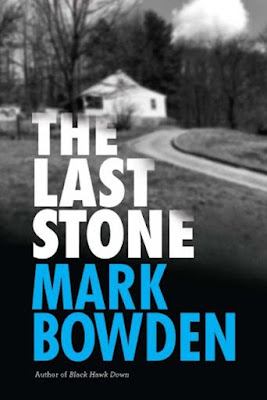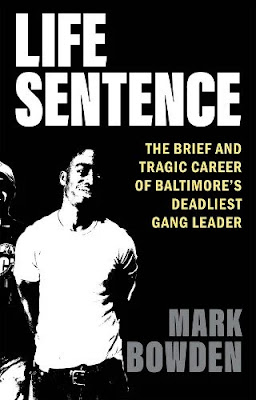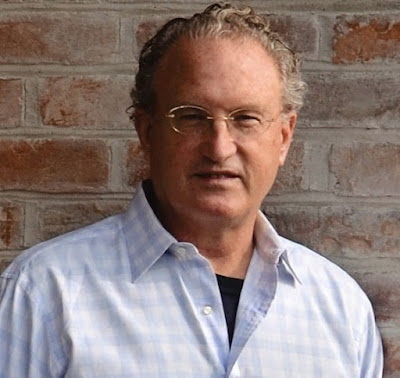I just finished reading Mark Bowden’s latest nonfiction crime book, Life Sentence: The Brief and Tragic Career of Baltimore’s Deadliest Gang Leader.
I've interviewed Mark Bowden (seen in the below photo) several times in the past years, and I hope to interview him again about Life Sentence for my On Crime column in the Washington Times.
Back in 2919, I reviewed another of his true crime books, The
Last Stone.
You can read the review via the below link or the below text:
BOOK REVIEW: 'The Last Stone' by Mark Bowden - Washington Times
Mark Bowden is mostly known as a writer who covers military
conflict in such nonfiction books as “Black Hawk Down,” “Killing Pablo,” and
“Hue 1968.” But he also wrote true crime books based on his journalism while he
was a reporter for the Philadelphia Inquirer.
“Doctor Dealer:
The Rise and Fall of an All-American Boy and His Multimillion-Dollar Cocaine
Empire,” was about a University of Pennsylvania dental student and later a
practicing dentist who was the head of Philadelphia’s “Yuppie Conspiracy,” a
major drug operation. “Finders-Keepers: The Story of a Man Who Found $1
Million,” was about a hapless, drug-addled South Philly man who found $1
million dollars that fell off an armored car — and lived to regret it.
Now Mark Bowden
has returned to the scene of a crime he reported on in 1975 when he was a cub
reporter for the Baltimore News-American. In “The Last Stone,” he offers a look
back at a horrendous crime and writes the sad ending to the story.
On March 29, 1975 Katherine Lyon, age 10, and Sheila Lyon, age 12, went missing from a Washington, D.C., suburban area shopping mall. Despite full press coverage from Richmond to Baltimore and a full-court police effort, the two children were never found.
The book opens a week after the girls went missing and Lloyd Welch, an 18-year-old seventh-grade dropout with a headband over his long, thick brown hair parted in the middle and a sad effort at a mustache, walked into the Wheaton Mall in Maryland and told a security guard that he knew something about the missing girls. The security guard called the police and two detectives quickly showed up to question him.
“He was scrawny and acned and mean; life had treated him harshly, and it showed. And, man, could he talk,” Mark Bowden writes. “Lloyd was a con artist. Words tumbled from him pell-mell, as if their sheer number and urgency could persuade. Whatever was true in what he said came wrapped in slippery layers of guile.”
After the two
girls vanished, area children were placed on lockdown. The case was given even
more notoriety as their father, John Lyon, was a local radio personality. A
week after the girls were reported missing, past the point most experts agree
diminishes greatly the chance that the victims will be found alive, the cops in
Montgomery County, Maryland, were desperate for information and a break in the
case. They were flooded with tips, but none were useful.
Lloyd Welch was
taken from the mall to police headquarters and questioned. Once a tape recorder
was turned on, Mr. Bowden tells us, Lloyd did what he did best. He lied.
He told
detectives that he saw two girls who fit the description talking to an older
man in the mall. He was given a lie detector test and failed. He then admitted
that he lied to the police. The cops probably sized him up as a knucklehead who
was high, and they kicked him loose after lecturing him about lying to the
police.
“After that, the
department didn’t give Lloyd Welch a second thought,” Mr. Bowden writes. “Not
for thirty-eight years.”
In 2013, the
Cold Case Lyon Squad was looking at a notorious pedophile and murderer as the
suspect in the case of the missing girls. The detectives came across Welch’s
interaction with the police in 1975 and thought he might be a potential
witness. Welch was serving a 33-year sentence in Delaware for the sexual
assault of a 10-year-old girl. After the initial interrogations, Welch himself
became the prime suspect and he would be interrogated by detectives on numerous
occasions.
Mark Bowden said
“The Last Stone” was built primarily around a dozen long interview sessions
conducted with Lloyd Welch. He viewed 70 hours of video. When he first met the
four Montgomery County detectives — Dave Davis, Chris Homrock, Mark Janney and
Katie Leggett — he asked the principal investigators if they had transcripts of
their interrogations.
Better, they
told the writer, we’ve got video.
Most of the
dialogue in the book was recorded, which Mr. Bowden said he edited for
concision and clarity.
Mr. Bowden also
recounts how the detectives investigated members of Welch’s family, many of
whom had a history of incest, child abuse and other offenses. The Welch clan
were sort of like TV’s “Beverly Hillbillies,” but without the humor or good
nature.
“The Last Stone”
is so named as the detectives unturned the last stone to discover the
perpetrator of a horrendous crime. The book is interesting and insightful and
makes one sad for the unfortunate girls and their parents.
The book is well-researched and well-written, and those interested in crime and police interrogation methods will find it most interesting.
Paul Davis covers crime, espionage and terrorism.




No comments:
Post a Comment